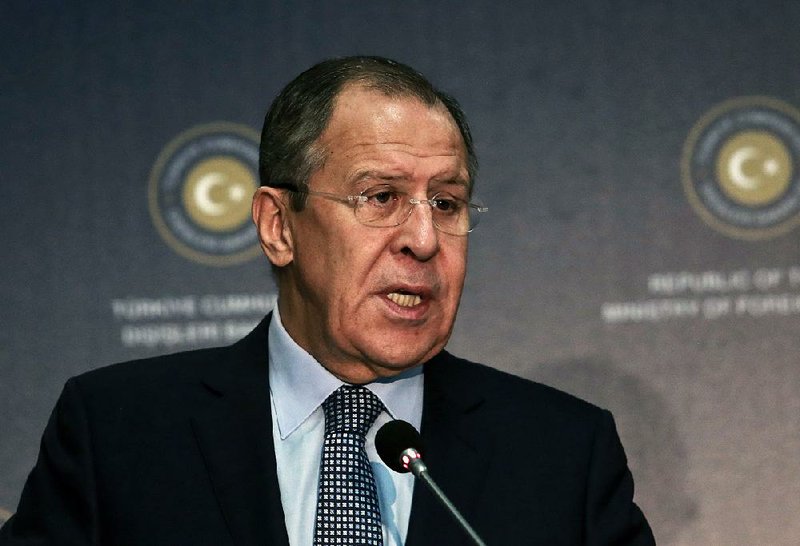ANKARA, Turkey -- Turkish Foreign Minister Mevlut Cavusoglu said Thursday that his country and Russia want a cease-fire in Syria, where the two nations support opposing camps in the conflict.
Speaking alongside Sergey Lavrov, his Russian counterpart, in a Turkish resort town, Cavusoglu said, "We are in agreement that a cease-fire is needed so that the tragedy can come to an end."
Turkey and Russia long have been at odds over the conflict in Syria, where Russia backs President Bashar Assad and Turkey supports rebel factions fighting to topple the Syrian leader.
The conflict has played out tragically in the divided city of Aleppo, where tens of thousands, mostly women and children, have been displaced from their homes in rebel-held areas since Saturday.
Cavusoglu said a cease-fire was needed in all of Syria but especially in Aleppo, where multiple temporary truces have fallen apart, in order for humanitarian aid to be delivered.
In reference to eastern Aleppo, Lavrov said his country will continue its support for the Syrian government until the city is "cleared of terrorists."
Russia and Turkey disagree over which elements of the Syrian opposition constitute terrorists, with Russia -- like its Syrian ally -- using the term loosely to encompass most armed opposition fighters. Despite that difference in approach, the interests of the two nations converge, at least in theory, when it comes to fighting the Islamic State extremist group.
Turkey views the jihadi movement as an outcome of the international community's failure to support the Syrian people against an authoritarian regime that has sought to bomb and starve its opponents to submission. "If there is no political solution in Syria, if there is no national unity, if its territorial integrity is not ensured, you may clear it of Daesh today, but tomorrow another organization will appear," Cavusoglu said using an Arabic acronym for the Islamic State.
Russia has been a staunch defender of the Syrian government and says its military involvement in the country is designed to stamp out the Islamic State and other extremists. Turkish President Recep Tayyip Erdogan caused waves in Russia this week with remarks suggesting that Turkey's military actions in Syria, where it has a small presence ostensibly to counter the Islamic State and contain the gains of Kurdish foes, aims to topple the Assad regime.
"Our president's, our views on Assad are known," Cavusoglu said. "We know that Assad is responsible for the deaths of 600,000 people. We may at times have different views on Assad with Russia, that is natural but in general on cease-fire, on humanitarian aid and a political solution -- we are in agreement with Russia."
The differences over Syria have translated into strained relations between Moscow and Ankara although the two nations have recently sought to downplay the divide. Cavusoglu said Turkey wanted to "deepen" cooperation with Russia while Lavrov said the two nations agreed that the "normalization [of ties] must be achieved fast."
In a similar statement, Russian President Vladimir Putin on Thursday voiced hope for mending a rift with the U.S. and pooling efforts in fighting terrorism.
His conciliatory state-of-the-nation address reflected Russia's hope that President-elect Donald Trump could help repair ties with Washington that have sunk to a post-Cold War low over the crisis in Ukraine, the Syria war and other disputes.
Putin emphasized that friendly relations between the two superpowers are essential for global stability.
"Russia-U.S. cooperation in solving global and regional problems answers the interests of the entire world," he said. "We share responsibility for ensuring global security and stability and strengthening the nonproliferation regime."
Tensions escalated during the U.S. election campaign, when President Barack Obama's administration accused Russia of hacking U.S. political sites and email accounts in an effort to interfere with the vote. The Kremlin has rejected the accusations.
Putin noted in his speech that Russia has faced "attempts of foreign pressure with all tools involved -- from the myths about Russian aggression, [allegations] of meddling in elections to the hounding of our athletes," a reference to doping scandals.
But he also emphasized that Russia bears no grudge against the West and is open for a "friendly and equal" dialogue on global issues.
He said Russia is "ready for cooperation with the new American administration" and hopes to pool efforts with the U.S. in combating international terrorism.
"Our servicemen in Syria are fulfilling that task," Putin added.
Russia has conducted an air campaign in support of Assad, helping his forces make significant gains, most recently in Aleppo, Syria's largest city before the war.
A U.S.-led coalition also has conducted airstrikes in Syria, targeting Islamic State militants, but that effort has faced criticism for imprecision and for striking civilians.
The coalition confirmed Thursday that July airstrikes in northern Syria near Manbij killed 24 civilians who were mixed in with Islamic State militants. The total is far fewer than the more than 50 dead initially reported by Syrian opposition activists.
Results of the strikes were released as part of a larger report that concluded 54 civilians were killed in seven airstrikes since March.
The 24 civilians were killed in two villages near Manbij, and their deaths came during intense fighting, including a wide ground offensive, to retake the northern city from militants. The Britain-based Syrian Observatory for Human Rights said at the time that at least 56 civilians were killed, but estimates varied wildly, and other groups put the number as high as 200.
The coalition said in its release Thursday that the civilians were "interspersed with combatants" in a known Islamic State staging area where no civilians had been seen in the 24 hours before the attack.
Information for this article was contributed by Vladimir Isachenkov and Lolita C. Baldor of The Associated Press.
A Section on 12/02/2016

